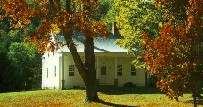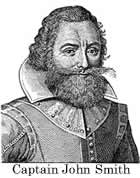Early Settlements
SUMMARY This lesson describes the settlement of New Hampshire from the very first visitors to the establishment of early towns in the state. This lesson describes the settlement of New Hampshire from the very first visitors to the establishment of early towns in the state.
Many historians believe that the Vikings were the first white men to visit New Hampshire's shores. The earliest explorers to leave a record of having been in New Hampshire were Martin Pring (1603), Samuel de Champlain (1605), and Captain John Smith (1614).
Smith's description of this new land was so impressive that the Prince of Wales named it New England. The excellent fishing in the waters off the New Hampshire shore was the reason for establishing the first permanent settlement. With the establishment of such a permanent base, the English could benefit from the region's natural resources. To encourage settlement in New England, wealthy British merchants gave land grants to men who would sail to the new land and set up permanent base camps. David Thompson was one of the first to receive such a grant, and he landed at Pannaway, or Odiorne's Point, in 1623. In contrast to their counterparts in Plymouth, Massachusetts, who came to New England for religious reasons, the New Hampshire settlers came strictly for commercial purposes. Another colony was begun in New Hampshire in 1623, and this settlement at Hilton Point (Dover) by Edward and William Hilton became the first permanent settlement in New Hampshire, as Pannaway was abandoned after a year or so. John Mason, a London merchant, was the founder of our state. Mason himself never saw New Hampshire, but he had a land grant here and arranged for settlers to come. He named the region after his home county of Hampshire. Strawbery Banke was established in 1630 with money and aid from John Mason. In 1653, it was renamed Portsmouth, after Mason's home. Portsmouth became our colonial capitol and a busy seaport. In 1638, Exeter was begun by Reverend John Wheelwright, a minister who had left the Massachusetts Bay Colony after religious conflict with the Puritan Church. Winnacunnet, or Hampton, was founded in the same year as Exeter by Reverend Stephen Batchelor (Bachiler), who moved there from Newbury, Massachusetts to establish a new church and colony. From these small, early colonies--whose total population in 1640 was approximately 100--began the growth of New Hampshire. OBJECTIVES1. To tell about the earliest visitors and explorers of New Hampshire. 2. To point out the reasons why the English wanted permanent colonies in New Hampshire. 3. To discuss the first towns established in the state. PRE-VIEWING ACTIVITIES1. Ask the children if they know when their town/city was established. How could they find out? 2. Have any of the students ever visited any of the towns along the New Hampshire coastline? Why do they think New Hampshire's first settlements were begun here? 3. On a map, point out the places to be discussed in the TV lesson. 4. Find an early map of New England (John Smith's) and compare it with a modern one. Are there any differences in how New Hampshire looks on each map? POST-VIEWING ACTIVITIES1. Have the class do further research into their town's establishment. When was it? Who were the founders? Why did people establish a settlement in their town? 2. Have the children do some personal research on their own families. Who were the first members of their families to come to New Hampshire? Why did they come here? 3. Pretend to be a cabin boy aboard one of Captain John Smith's ships. Keep a diary for seven days. Describe weather, events aboard ship, sighting land, meeting Native Americans. 4. "Publish" an illustrated English newspaper dealing with an early exploration. Include headings, and such things as interviews with explorers, feature story about the voyage, maps, cartoons, ads for sailors and colonists. 5. Write what you think might happen if a Native American boy and a boy from Pannaway should meet. 6. Have students write a brief history of their town's origin for their notebooks. 7. Discuss the importance of the sea to these early towns. 8. Bring to class some models of early sailing vessels. 9. Select one article that the colonists might have brought with them. Illustrate and write a report on the chosen item (include a description and how it was used). 10. Dramatize: a. A group of colonists sighting land after their long, hard voyage. b. Settlers selecting a site for their new home. c. Clearing land--a logrolling party. 11. Illustrate types of early homes built in New Hampshire. 12. What kinds of clothes and utensils did these early settlers use? Compare to students' clothes today. 13. Have the class study methods of fishing used by the early settlers. Visit the fishing docks in Portsmouth and learn how fish are caught today. What are the differences? The similarities? 14. Have the students dramatize Thompson and his group discussing what to build (houses, barns, storehouses, and so forth) at Pannaway; have them dramatize Captain John Smith presenting his map and description of New Hampshire to Prince Charles of Wales. VOCABULARY
PLACES TO VISIT
PLACES TO KNOW
PEOPLE TO KNOW
IMPORTANT DATES
WEB RESOURCES |

 One of the first European visitors to the
One of the first European visitors to the